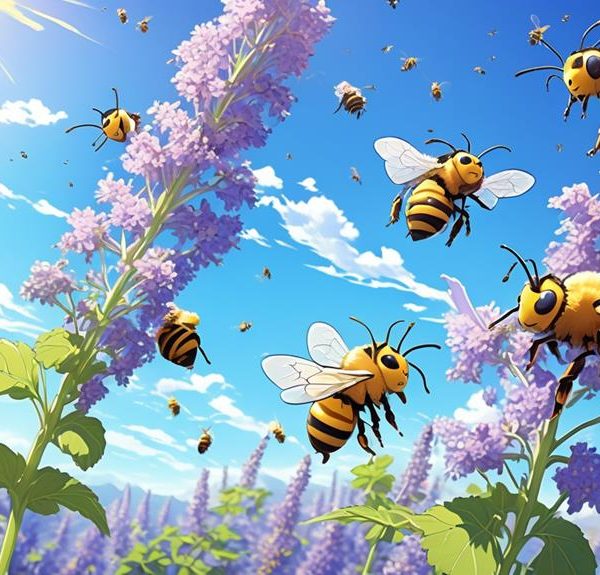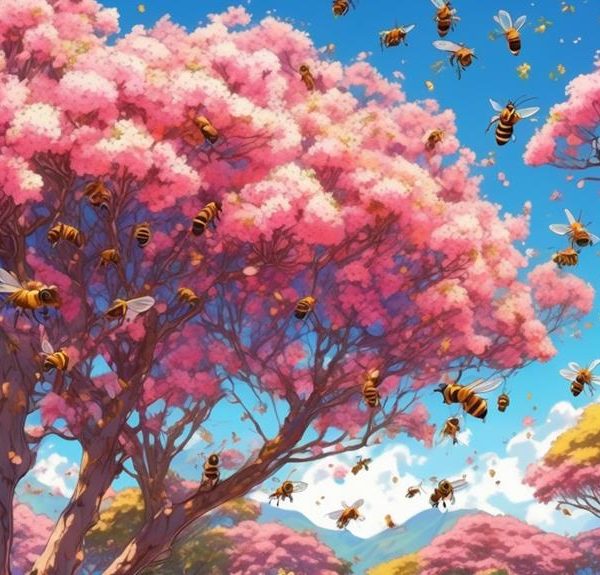Dive into the complex relationship between bees and eucalyptus; a mysterious dance of nature that's more intricate than you might imagine.
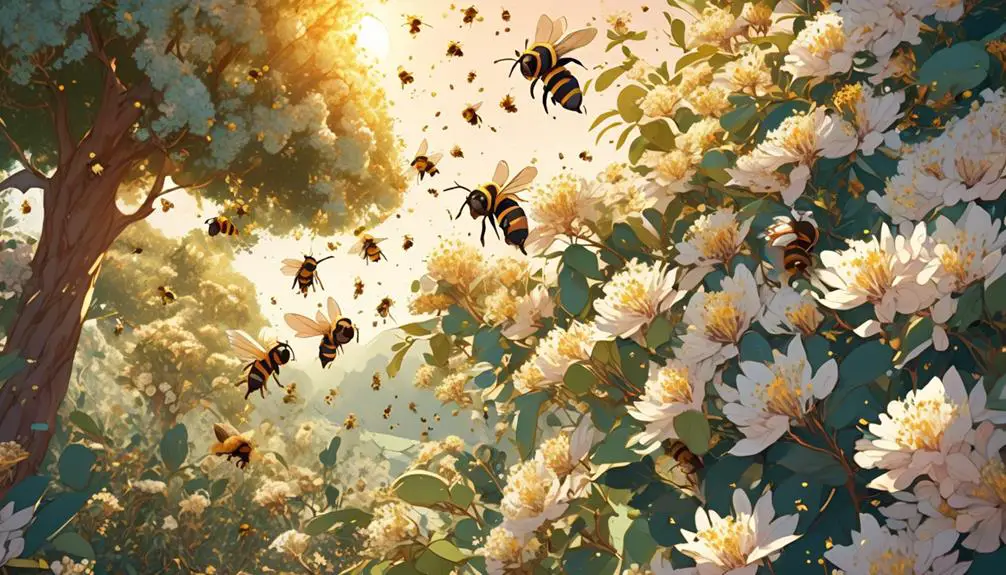
Do Bees Like Eucalyptus?
Beloved by bees or barren of benefits? That's the question we're asking when it comes to the relationship between bees and eucalyptus.
You might know that bees are attracted to certain plants for their nectar and pollen, but it's less clear whether eucalyptus is a favorite stop on their floral foraging routes.
The answer might seem simple, but it's more complex than you'd think, intertwined with factors like bee species, eucalyptus variety, location, and season.
So buckle up, as we're about to embark on an exploration that might just change your perspective on these buzzing pollinators and these towering trees.
Key Takeaways
- Bees are attracted to eucalyptus trees because they provide rich nectar as a food source.
- Eucalyptus trees benefit from bee pollination, aiding in their reproduction process.
- Some eucalyptus species produce toxic nectar, leading to bee mortality.
- The relationship between bees and eucalyptus has significant implications for bee populations and the broader ecosystem.
Understanding Bee Attraction Factors
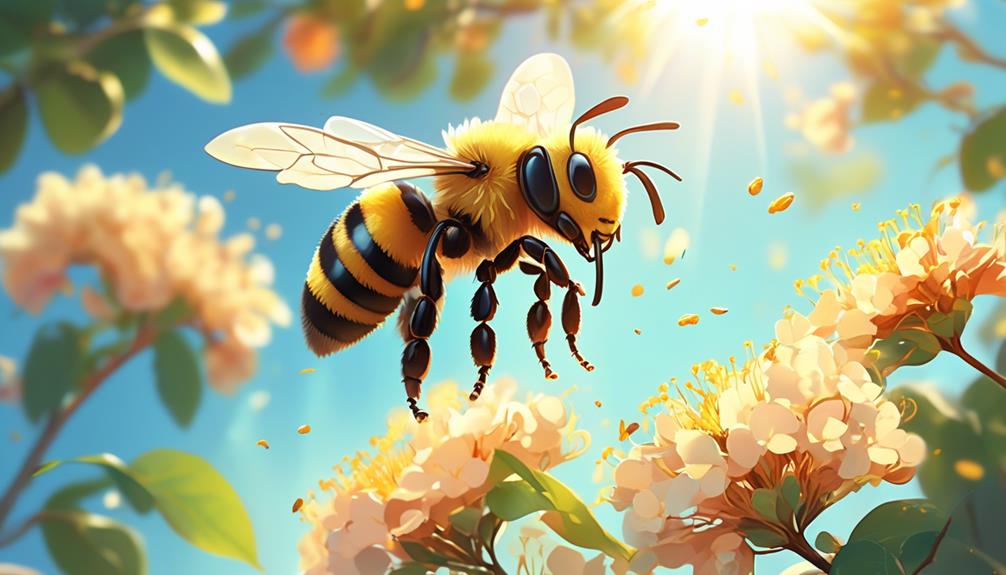
To comprehend why bees might be attracted to eucalyptus, it's vital to first understand the key factors that generally lure bees to certain plants. Bees aren't randomly buzzing around; they're strategic and driven by specific needs. Primarily, they're seeking pollen and nectar, their main food sources.
Plants release a cocktail of volatile organic compounds, known as VOCs, that bees can detect. These VOCs, which include various scents and colors, essentially advertise the plant's nectar and pollen availability. You'll notice bees are especially attracted to brightly colored, fragrant plants.
Another crucial factor is the shape and structure of the plant's flowers. Bees prefer flowers that provide easy access to nectar and pollen. For instance, tube-like flowers allow bees to crawl inside and collect nectar from the base.
Lastly, the local environment and the season play a significant role. Bees are more active during warmer months and prefer areas with a diverse range of flowering plants.
In essence, if the eucalyptus tree satisfies these criteria, it's likely to attract bees. Further in this article, you'll explore how well eucalyptus fits into this picture.
The Eucalyptus Plant: A Brief Overview
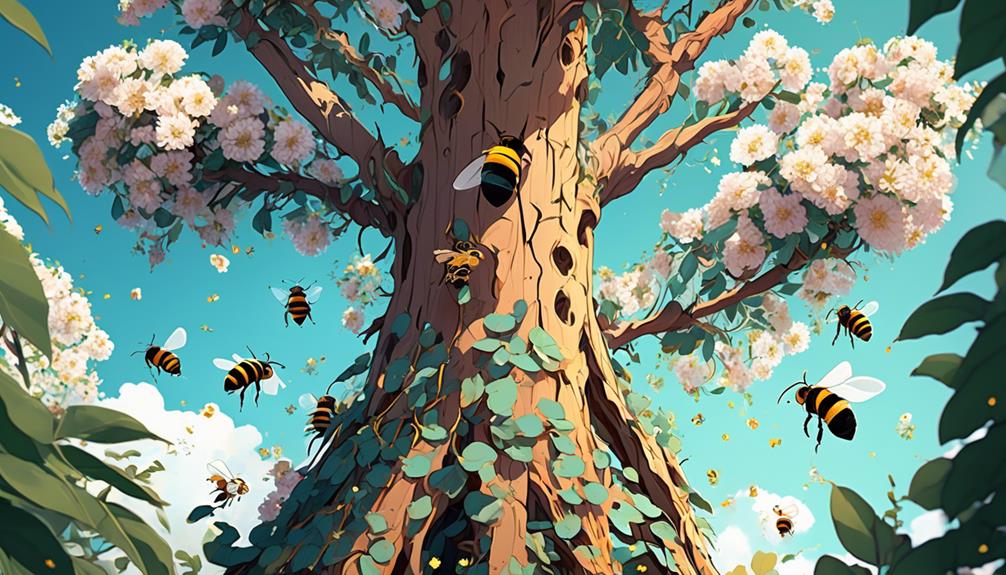
Before diving into the relationship between bees and eucalyptus, let's get a handle on the eucalyptus plant itself. Originating from Australia, the eucalyptus is an evergreen tree that's part of the Myrtaceae family. This plant family is known for its high oil content and aromatic qualities.
Eucalyptus trees can grow up to 60 meters tall, with leaves that have a unique, lanceolate shape. These leaves aren't just for show, they're packed with essential oils that are used in various industries. From pharmaceuticals to perfumery, the eucalyptus has made its mark.
But the real star of the eucalyptus tree is its flower. The bloom is a vibrant display of fluffy stamens, often white, yellow, or red. And it's not just a pretty sight, it's a nectar powerhouse. The eucalyptus flower produces copious amounts of nectar, a liquid rich in sugars.
Moreover, the eucalyptus has a unique adaptation to survive harsh conditions. It has a thick, fire-resistant bark that allows it to thrive in fire-prone environments. So, while eucalyptus trees are most commonly associated with Australia, they're also found in temperate climates across the globe.
Bees and Eucalyptus: A Complex Relationship
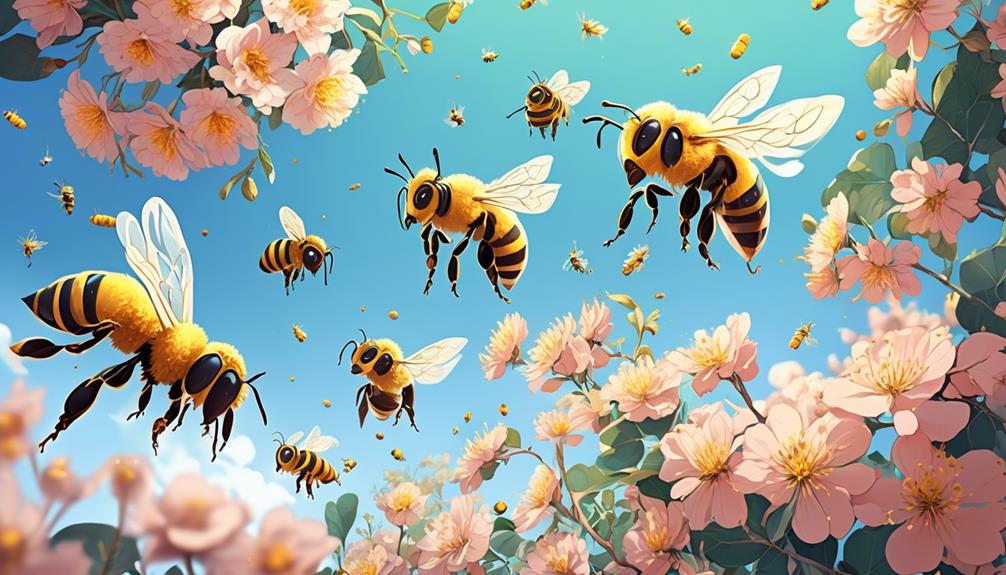
In the realm of nature, bees and eucalyptus trees share a complex and symbiotic relationship that's driven by mutual benefits. As a beekeeper, you might've wondered why bees are often found buzzing around eucalyptus trees. The answer lies in the rich nectar provided by these trees, which bees use as a food source.
This nectar, rich in sugars, serves as a high-energy food for bees, allowing them to produce honey and sustain their hives. You'll find that eucalyptus honey has a robust, slightly medicinal flavor, reflecting the tree's distinct characteristics.
However, it's not a one-sided affair. While bees benefit from eucalyptus nectar, the trees gain from the bees' pollination activities. As bees move from flower to flower, they facilitate the transfer of pollen, aiding in the eucalyptus trees' reproduction process.
Yet, this relationship isn't without its challenges. Some eucalyptus species produce a type of nectar that can be toxic to certain bee species, leading to bee mortality. As a result, understanding the specific interactions between different bee and eucalyptus species is crucial for effective beekeeping and conservation efforts.
Impact on Bee Population and Ecosystem
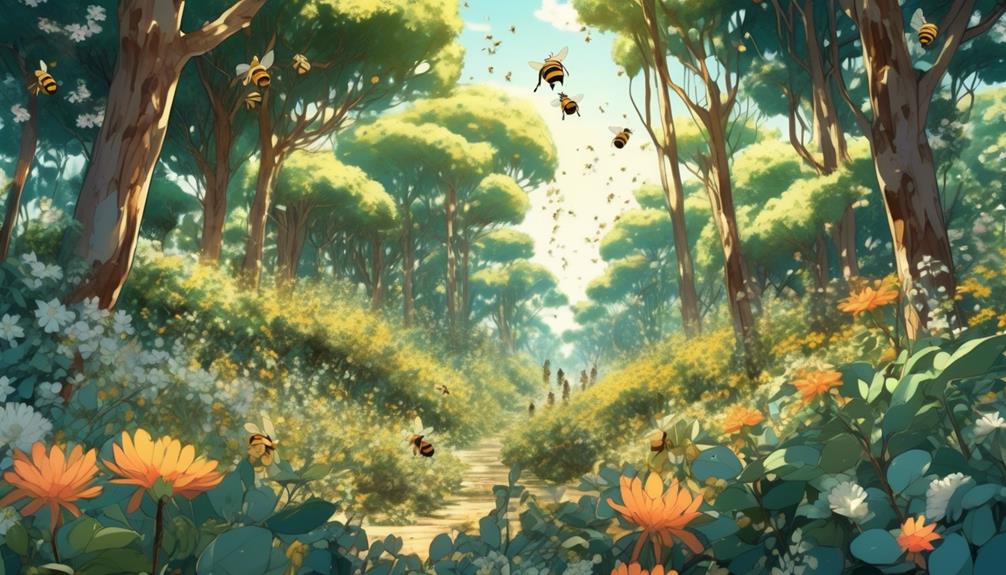
While you might see bees buzzing around eucalyptus trees, it's essential to understand that this interaction significantly impacts both the bee population and the broader ecosystem. Bees, as pollinators, play a crucial role in the propagation of eucalyptus species. In the process, they obtain nectar, which is a vital food source for them. However, you need to know that not all eucalyptus nectar is beneficial for bees. Some species produce toxic nectar, leading to a phenomenon called 'mad honey disease,' which can decimate bee colonies.
This interaction between bees and eucalyptus trees has a ripple effect on the ecosystem too. Healthy bee populations facilitate the growth of diverse plant species, contributing to biodiversity. When bees interact with toxic eucalyptus species, it could lead to a reduction in their population, impacting this biodiversity negatively. It's a delicate balance, one that requires careful scrutiny.
Moreover, changes in the bee population can have significant repercussions for agriculture, as many crops rely on bees for pollination. So, your perception of bees buzzing around eucalyptus trees should go beyond the surface; it's an interaction that affects more than just the bees and the trees.
Practical Implications for Beekeepers
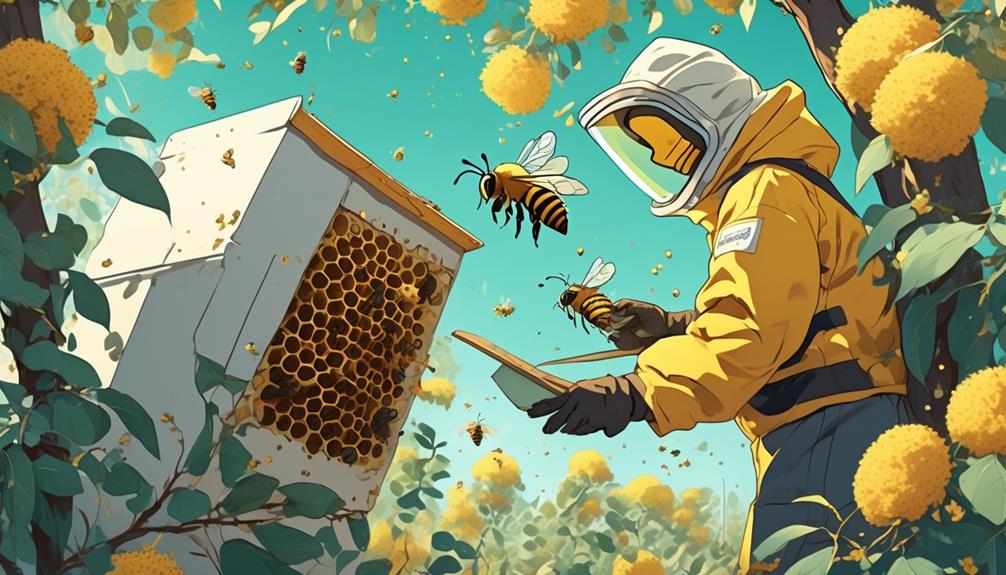
As a beekeeper, you'll need to carefully consider the implications of housing your hives near eucalyptus trees due to their potential impact on bee health and honey production. These trees, while offering a rich nectar source, can also introduce certain challenges.
Concern | Explanation | Solutions |
|---|---|---|
Honey Production | Eucalyptus nectar may impact the taste and color of your honey. | Monitor honey production and consumer feedback. |
Bee Health | Eucalyptus' strong scent may affect bee navigation. | Provide other plant sources to diversify their diet. |
Hive Placement | Proximity to eucalyptus trees may influence hive health. | Experiment with hive placement and monitor results. |
Your honey's unique flavor and color could be a selling point, but it's crucial to assess how consumers react to the eucalyptus influence. The strong scent of eucalyptus may impact bees' ability to navigate back to the hive, so diversifying their diet with other floral sources is advisable. Lastly, the proximity of your hives to eucalyptus trees could affect hive health, necessitating careful observation and possibly strategic relocation. Remember, a well-balanced ecosystem is crucial for the health of your bees and the quality of your honey.
Frequently Asked Questions
How Does the Smell of Eucalyptus Affect the Behavior of Bees?
You're wondering how eucalyptus smell impacts bees.
Bees are indeed attracted to the potent scent of eucalyptus. They're drawn to its nectar-rich flowers. However, they aren't fans of the plant's strong aroma.
Eucalyptus oil is often used as a natural bee deterrent. So, while they'll brave the smell for the promise of nectar, they won't stick around for the scent alone.
It's a delicate balance of attraction and repulsion.
Can Bees Benefit From the Medicinal Properties of Eucalyptus?
Yes, bees can benefit from eucalyptus. It's not just about their attraction to its strong scent.
The nectar from eucalyptus flowers provides a nutrient-rich food source.
Additionally, the medicinal properties of eucalyptus, including its antimicrobial and antifungal traits, can support bee health, helping them to fight off diseases and parasites.
What Other Plants Are Bees Attracted to Besides Eucalyptus?
You're curious about other plants that attract bees. Besides eucalyptus, bees love a variety of plants. They're especially drawn to lavender, sage, and thyme.
You'll also find them buzzing around sunflowers, cosmos, and zinnias. If you've got fruit trees, like apple or cherry, you'll see bees there too.
How Does the Climate and Season Affect the Relationship Between Bees and Eucalyptus?
You must understand that climate and season greatly affect bees' interaction with eucalyptus.
In cooler seasons, bees aren't as active, so they won't frequent eucalyptus as much.
Conversely, in warmer climates and during blooming season, bees are drawn to the nectar-rich eucalyptus flowers.
However, extreme heat can deter bees.
Are There Any Specific Species of Bees That Are More Attracted to Eucalyptus Than Others?
Absolutely, there are specific bee species more attracted to eucalyptus than others. For instance, honeybees love eucalyptus due to its rich nectar. They often gather in large numbers around these trees.
However, it's not limited to honeybees. Eucalyptus also attracts native Australian bees, particularly the Blue Banded and the Teddy Bear bees.
But remember, the attraction greatly depends on the specific eucalyptus species and its flowering season.
Conclusion
In conclusion, bees' relationship with eucalyptus is complex. While attracted to its blooming flowers, the eucalyptus nectar can be detrimental to their health.
This dynamic has significant implications for ecosystems and bee populations. As a beekeeper, understanding this relationship is crucial. You must balance the bees' attraction to eucalyptus with the potential risks.
Ultimately, this contributes to the sustainability and health of your local bee population.

